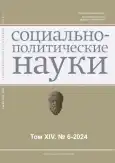Methodological principles of analyzing the transformations of the civilizational and political space of Russia in the XXI century
- 作者: Asonov N.V.1,2
-
隶属关系:
- Moscow Pedagogical State University (MPSU)
- Institute of Scientific Information for Social Sciences of the Russian Academy of Sciences (ISISS RAS)
- 期: 卷 14, 编号 6 (2024)
- 页面: 16-23
- 栏目: History and Theory of Politics
- URL: https://journals.eco-vector.com/2223-0092/article/view/653967
- DOI: https://doi.org/10.33693/2223-0092-2024-14-6-16-23
- EDN: https://elibrary.ru/CMYPRL
- ID: 653967
如何引用文章
详细
Based on the nature of political science, which focuses on the study of power as the foundation of all social relations, the author reveals their understanding of the methodological principles for analyzing changes in the civilizational and political space of Russia in the 21st century.
The aim of the research is to identify the specifics of the methodological principles that will help uncover the further path of transformation in Russia’s civilizational and political space.
Research Methods. Achieving this goal requires the application of several specialized methods: political, conflictology, cultural-formational, and civilizational. Due to their significance, they are classified as research approaches that combine with value-comparative and systemic methods.
The results of the research indicate that a deeper understanding of the ongoing transformation of Russia’s civilizational and political space can be achieved through the comprehensive use of four methodological principles of scientific analysis. These principles are the principles of socio-political facts, socio-political definitions, socio-political behavior, and socio-historical determinism. Their application allows for the assertion that Russia’s transformation in the 21st century can only proceed along a path that corresponds to the liberal political system imposed on us in the late 20th century. This path aligns with the North Atlantic civilization and has the potential to turn Russia into a major center of intercivilizational conflicts, leading it into complete decline. The way out of the current situation is seen only in restructuring the country’s political system in accordance with traditional values.
全文:
作者简介
Nikolai Asonov
Moscow Pedagogical State University (MPSU); Institute of Scientific Information for Social Sciences of the Russian Academy of Sciences (ISISS RAS)
编辑信件的主要联系方式.
Email: nbassonov@yandex.ru
SPIN 代码: 5304-5496
Dr. Sci. (Polit.), Associate Professor, Professor
俄罗斯联邦, Moscow; Moscow参考
- Weber M. Favorites: Protestant ethics and the spirit of capitalism. Moscow: ROSSPEN, 2006. 656 p.
- Kissinger H. World order. Moscow: AST, 2015. 512 p.
- Kissinger H. To understand Putin. The politics of common sense. Moscow: Algorithm, 2015. 208 p.
- Makkinder X.Dj. Geographical axis of history. Polis. No. 4. Pp. 162–169. (In Rus.)
- Marasanova V.M., Baghdasaryan V.E., Ierusalimsky Yu.Yu. et al. The foundations of Russian statehood: Educational and methodical complex of the discipline for the educational organizations of higher education. Moscow: Publishing House “Delo” RANEPA, 2023. 212 p.
- Pantin W.I. Cycles and waves of history: Nature, man, society, culture. Moscow: The Political Encyclopedia, 2023. 310 р.
- Engels F. Conditions of the working class in England. In: Marx K., Engels F. Selected works. In 9 vols. Vol. 1. Moscow: Politizdat, 1984. 549 p.
- Shabrov O.F. National-State identity in the context of global confrontation: The problem of the stability of social systems. Sociopolitical Sciences. No. 4. 2023. Pp. 16–26. (In Rus.). doi: 10.33693/2223-0092-2023-13-4-15-26. EDN: JGKLBE.
- Ashby W.R. Brain construction. Origin of adaptive behavior. Moscow: Foreign Literature, 1962. 395 p.
- Dahrendorf R. Life changes: Approaches to social and political theory. Chicago, 1979. 181 р.
补充文件










